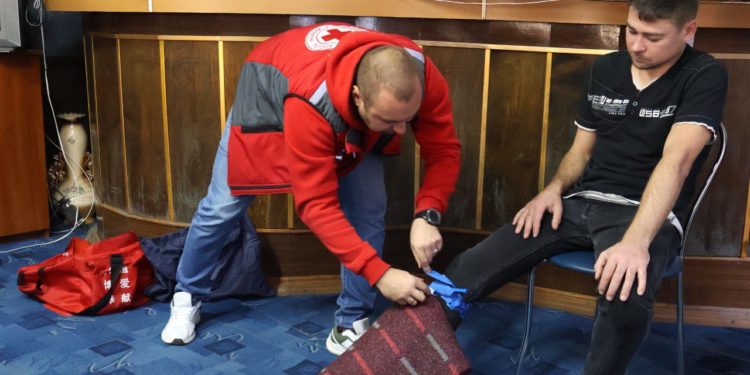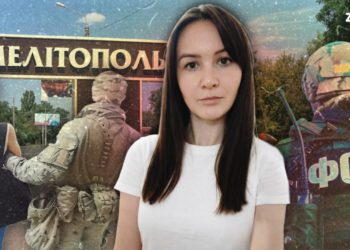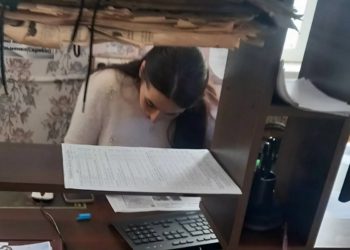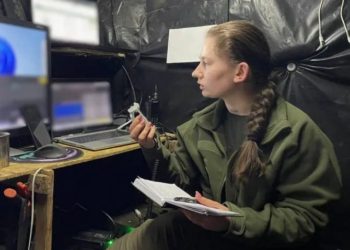What media workers need to know and be able to do in order to help themselves and those who have suffered during shelling or bombing, if necessary – this was discussed at the training organized by the Zaporizhzhia Journalists’ Solidarity Center of the National Union of Journalists of Ukraine (NUJU). Together with the coaches, the media workers updated their previously acquired knowledge and practical skills. Experienced coach Tetiana Shkola helped them with this.
“There is never too much information on protecting your life and health! Especially for journalists, who often find themselves in a risk zone due to their profession. So, you need to be able to help yourself and people who have come under shelling or bombing if necessary. That is why, at your request, we constantly conduct training sessions for you at various locations so that you can master the knowledge and skills of providing first aid in extreme conditions. Because to learn this, one or two classes are not enough, – noted the coach-instructor of the Zaporizhzhia Regional Organization of the Red Cross of Ukraine Serhii Smetankin.
Journalists received a number of recommendations from the coaches.
- Algorithm of first aid actions
- Make sure there is no danger.
- Examine the victim to determine the presence of consciousness and breathing.
- Call the emergency medical team.
- If there is no bleeding;
- put on gloves;
- raise the limb;
- apply a clean, sterile napkin and bandage to the wound.
- If the bleeding is arterial:
- apply a clean, sterile napkin to the wound and press directly on the wound;
- raise the limb;
- if the bleeding has not stopped, apply a pressure bandage to the wound and, if possible, simultaneously press the artery at a distance;
- if the bleeding is not stopped, apply a tourniquet.
- If the bleeding is venous:
- apply a clean, sterile cloth to the wound and apply pressure directly to the wound;
- raise the limb;
- if the bleeding is not stopped, apply a bandage to the wound;
- lay the victim on his back with his legs raised slightly above the level of the heart;
- cover the victim with a blanket;
- if the person is crushed by heavy debris, in no case do not release him until you have applied a tourniquet or tourniquet above the place of compression.
- If there is no breathing, begin cardiopulmonary resuscitation:
- perform 30 chest compressions with a depth of at least 5 cm (no more than 6 cm) at a rate of 100 compressions (no more than 120) per minute;
- perform two breaths using a valve mask, breathing mask, etc. In the absence of protective equipment, you cannot perform artificial respiration, but only perform chest compressions. Performing two breaths should last no more than 5 seconds;
- repeat the previous two points alternately until the ambulance arrives.
It is important to change the person performing chest compressions every 2 minutes.
Call the Zaporizhzhia JSC at 096 277 5352 (Nataliya Kuzmenko and Valentyna Manzhura, the Zaporizhzhia JSC coordinators). The Center’s address is 152 Sobornyi Avenue.
ABOUT JSC
The Journalists’ Solidarity Centers is an initiative of the NUJU implemented with the support of the International and European Federations of Journalists and UNESCO. The initiative is designated to help media representatives working in Ukraine during the war. The Centers operate in Kyiv, Lviv, Ivano-Frankivsk, Chernivtsi, Zaporizhzhia, and Dnipro and provide journalists with organizational, technical, legal, psychological, and other types of assistance.
ABOUT UNESCO
UNESCO is the United Nations Educational, Scientific, and Cultural Organization. It contributes to peace and security by promoting international cooperation in education, sciences, culture, communication, and information. UNESCO promotes knowledge sharing and the free flow of ideas to accelerate mutual understanding. It is the coordinator of the UN Action Plan on the Safety of Journalists and the Issue of Impunity, which aims to create a free and safe environment for journalists and media workers, thus strengthening peace, democracy, and sustainable development worldwide. UNESCO is working closely with its partner organizations in Ukraine to provide support to journalists on the ground.
The designations employed and the presentation of material throughout this digest do not imply the expression of any opinion whatsoever on the part of UNESCO concerning the legal status of any country, territory, city, or area or its authorities or concerning the delimitation of its frontiers or boundaries.
The authors are responsible for the choice and the presentation of the facts contained in this digest and for the opinions expressed therein, which are not necessarily those of UNESCO and do not commit to the organization.
Valentyna Bystrova
Photo by Dariya Zyrianova

 THE NATIONAL UNION OF
JOURNALISTS OF UKRAINE
THE NATIONAL UNION OF
JOURNALISTS OF UKRAINE
















Discussion about this post